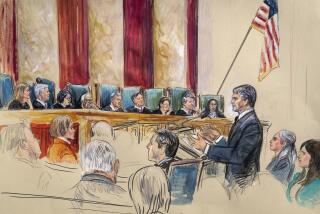Justice and Gitmo
On the day after the last official day of its term, the high court reversed itself and agreed to consider whether the Constitution affords the Guantanamo detainees habeas protection. In action that required the votes of five justices, it fast-tracked an appeal of a decision by a federal appeals court that alleged enemy combatants did not have a constitutional right to challenge their detention in federal court. In April, the justices had refused to do so.
The justices’ initial reluctance to intervene in the habeas dispute was characteristic of the caution with which they have approached legal issues raised by the Bush administration’s post-Sept. 11 policies. For example, in ruling in 2004 that inmates at Guantanamo were entitled to habeas protection, the court grounded that right in a federal statute. But Justice John Paul Stevens also noted that habeas corpus is a “writ antecedent to statute throwing its root deep into the genius of our common law.”
Unfortunately, in enacting legislation supposedly designed to bring the detention system into conformity with the court’s ruling, Congress stripped the inmates of habeas protection. Instead, it provided it only for circumscribed judicial review of decisions classifying detainees and military combatants and of war-crimes convictions by newly established military commissions.
That would have changed with enactment of the Habeas Corpus Restoration Act of 2007, co-sponsored by Sen. Patrick J. Leahy (D-Vt.), the chairman of the Senate Judiciary Committee, and Sen. Arlen Specter (R-Pa.), the panel’s ranking member. But while habeas legislation has cleared the Judiciary Committee, there is no sign that Congress as a whole will approve it. Even if it did, President Bush could veto the measure.
Restoring habeas is the beginning, not the end, of necessary reforms in the Military Commissions Act approved by Congress last year. Important as it is, habeas only gets a prisoner into the courtroom. It doesn’t provide judges with detailed guidance about whether a particular prisoner has received due process.
The problem is that Congress, in collusion with the Bush administration, has provided only a bare-bones process for determining whether an inmate is indeed an unlawful enemy combatant. A so-called Combatant Status Review Tribunal consisting of three U.S. military officers determines whether a suspect is an enemy combatant; the inmate must face that tribunal without the assistance of a lawyer. At the military’s discretion, an enemy combatant may later be tried by a military commission with some but not all of the protections afforded by civilian courts and the Uniform Code of Military Justice.
The administration will continue to argue that the war on terror requires extraordinary measures. That may be, but the measures adopted at Guantanamo depart so radically from American traditions that they subvert this nation’s standing as a land of liberty. To reclaim that mantle while waging an open-ended campaign against terrorism requires that suspected terrorists have a meaningful opportunity to assert their innocence. We now know well that the administration will not do the right thing. Congress should. If it does not, the court must.
More to Read
A cure for the common opinion
Get thought-provoking perspectives with our weekly newsletter.
You may occasionally receive promotional content from the Los Angeles Times.






